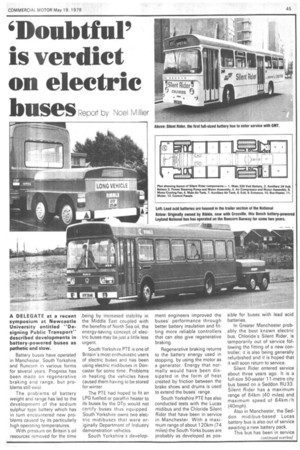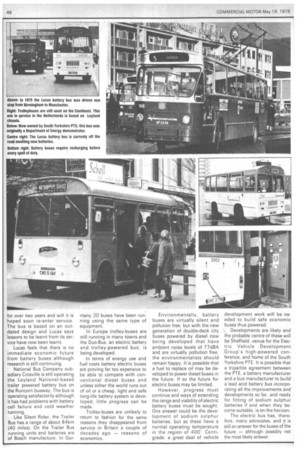'Doubtful' is verdict on electric
Page 47

Page 48

If you've noticed an error in this article please click here to report it so we can fix it.
buses Report by Noel
A DELEGATE at a recent symposium at Newcastle University entitled "Designing Public Transport" described developments in battery-powered buses as pathetic and slow.
Battery buses have operated in Manchester South Yorkshire and Runcorn in various forms for several years. Progress has been made on regenerative braking and range, but problems still ex[st.
The problems of battery weight and range has led to the development of the sodium sulphur type battery which has in turn encountered new problems caused by its particularly high operating temperatures.
With pressure on Britain's oil resources removed for the time
,being by increased stability in the Middle East coupled with the benefits of North Sea oil, the energy-saving concept of electric buses may be just a little less urgent.
South Yorkshire PTE is one of Britain's most enthusiastic users of electric buses and has been using electric rnidibuses in Doncaster for some time. Problems in heating the vehicles have caused them having to be stored for winter.
The PTE had hoped to fit an LPG fuelled or paraffin heater to its buses by the Dip would not certify buses thus equipped. South Yorkshire owns two electric midibuses that were originally Department of Industry 'demonstration vehicles_
South Yorkshire's develop
ment engineers improved the buses' performance through better battery insulation and fitting more reliable controllers that can also give regenerative braking.
Regenerative braking returns to the battery energy used in stopping, by using the motor as a generator. Energy that normally would have been dissipated in the form of heat created by friction between the brake shoes and drums is used to extend the buses' range.
South Yorkshire PTE has also conducted tests with the Lucas mid ibus and the Chloride Silent Rider that have been in service in Manchester. With a maximum range of about 120krn (74 miles) the South Yorks buses are probably as developed as pos
sible for buses with lead acid batteries.
In Greater Manchester probably the best known electric bus, Chloride's Silent Rider, is temporarily out of service following the fitting of a new controller; it is also being generally refurbished and it is hoped that it will soon return to service.
Silent Rider entered service about three Years ago. It is a full-size 50-seater 11-metre city bus based on a Seddon RU33. Silent Rider has a maximum range of 64km (40 miles) and maximum speed of 64km /h (40mph).
Also in Manchester, the Seddon midibus-based Lucas battery bus is also out of service awaiting a new battery pack.
This bus has been in service conLinued overleaf for over two years and will it is hoped soon re-enter 'service. The bus is based on an outdated design and Lucas says lessons to be learnt from its service have now been learnt.
Lucas feels that there is no immediate economic future from battery buses although research is still continuing.
National Bus Company subsidiary Crosville is still operating the Leyland National-based trailer powered battery bus on the Runcorn busway. The bus is operating satisfactorily although it has had problems with battery cell failure and cold weather running.
Like Silent Rider, the Trailer Bus has a range of about 64km (40 miles). On the Trailer Bus running units and batteries are of Bosch manufacture. In Ger
many 20 buses have been running using the same type of equipment.
In Europe trolley-buses are still running in many towns and the Duo-Bus, an electric battery and trolley-powered bus, is being developed.
In terms of energy use and fuel costs battery electric buses are proving for too expensive to be able to compete with conventional diesel buses and unless either the world runs out of oil or a cheap, light and safe long-life battery system is developed, little progress can be made Trolley-buses are unlikely to return to fashion for the same reasons they disappeared from service in Britain a couple of decades ago — reasons of economics. Environmentally, battery buses are virtually silent and pollution free, but with the new generation of double-deck city buses powered by diesel . now being developed that have ambient noise levels of 77dBA and are virtually pollution free, the environmentalists should remain happy. It is possible that a fuel to replace oil may be developed to power diesel buses in the future. If so the future for electric buses may be limited.
However, progress must continue and ways of extending the range and viability of electric battery buses must be sought. One answer could be the development of sodium sulphur batteries, but as these have a normal operating temperature in the region of 400 Centigrade, a great deal of vehicle development work will be needed to build safe economic buses thus powered.
Developments are likely and the probable centre of these will be Sheffield, venue for the Electric Vehicle Development Group's high-powered conference, and home of the South Yorkshire PTE. It is possible that a tripartite agreement between the PTE, a battery manufacturer and a bus manufacturer to build a lead acid battery bus incorporating all the improvements and developments so far, and ready for fitting of sodium sulphur batteries if and when they become suitable, is on the horizon.
The electric bus has, therefore, many advocates, and it is still an answer for the buses of the future — although possibly not the most likely answer.












































































































